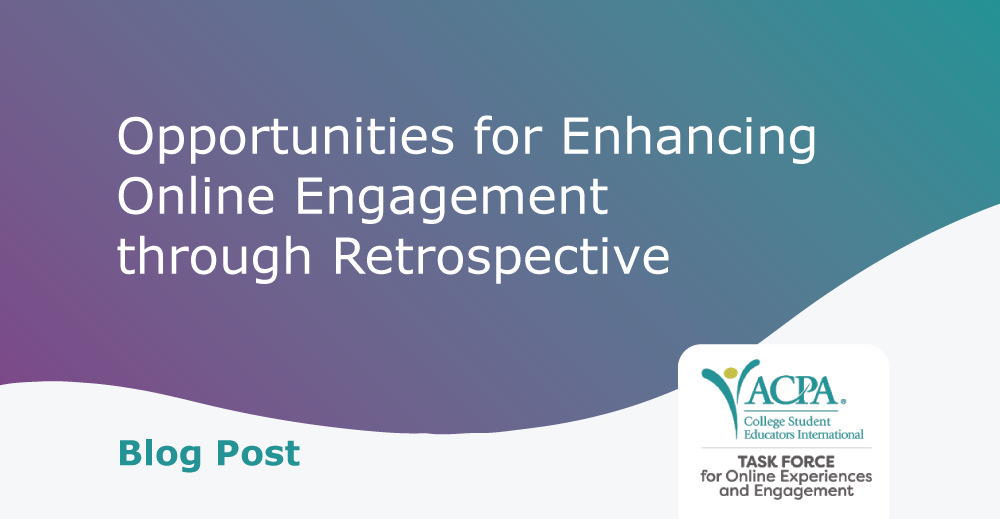
On March 11, 2020, the World Health Organization (WHO) declared COVID-19 a global pandemic. This turned our lives upside-down. In a matter of days, we suddenly needed to navigate our own families and lives, but we also needed to find new ways to interact and engage with each other while doing so safely from a distance. For many this was through online and virtual tools and technology. With the resources available, these online and virtual tools had to be initiated to keep as many functions operating as possible.
Over the past two years, through all the headaches, heartbreaks,
challenges, and struggles, people have been creative and resilient.
Over the past two years, through all the headaches, heartbreaks, challenges, and struggles, people have been creative and resilient. A quote that came to mind for me during the Summer of 2020, was the time old phrase “When the going gets tough, the tough get going.” Besides having to kindly remind people they are on mute during a video call, online engagement has come to encompass a variety of tools and solutions.
Now we are just past the two year mark. We can use this as an opportunity to reflect back on the creativity and resilience, especially the online and virtual tools, solutions, and technology that has been implemented to foster and enhance engagement over the past two years. One format to frame this is called a “retrospective,” defined by Merriam-Webster as: “relating to, or given to retrospection, the act or process or an instance of surveying the past.” Simply stated, a retrospective is a team discussion about what went right, what went wrong, and how to improve. In other words, a discussion focused on answering four simple questions:
- What worked well?
- What didn’t work well?
- What should we continue doing?
- What could we improve upon?

In the context of engagements in an online or virtual space, which engagements helped our group increase effectiveness? Which online tools saw the highest responsiveness from students? Which online tools had challenges, which we could now reevaluate for improvements or modifications?
Another framework format that could be used to facilitate this reflection is called a SWOT analysis (http://mci.ei.columbia.edu/files/2012/12/An-Essential-Guide-to-SWOT-Analysis.pdf), as suggested by Lindsay Smith, Chair of ACPA Online Experiences & Engagement Task Force, and Program Mentor, College of Business Western Governors University. SWOT is an acronym for Strengths, Weaknesses, Opportunities, and Threats. In this context, the “threats” portion can be loosely translated to challenges or issues that should be avoided in the future.

Reflecting on the quick pivot to online learning due to the pandemic gives us a chance to evaluate the strategies implemented mid-course to provide opportunities for improvement to maximize student engagement. For example, when reflecting on moving a peer mentoring program to an online-only format:
- Strengths: A strength identified was that students could access the peer mentoring services more easily due to not having to park on campus, which was always a struggle.
- Opportunities: An opportunity that we found was that most students wanted to access online peer mentoring services outside of business hours. Since we had never had the bandwidth to keep professional staff with the peer mentors at the office after hours, it seemed unattainable before the pandemic to have peer mentoring services after business hours.
- Challenges: Even though the challenge, as their supervisor, was that I was not immediately around for questions after hours, we found that offering these new non-business hour peer mentoring services catered to a specific population of students that we were unable to serve until the pandemic. Now we’ve revised our note-taking processes, expanded the hours peer mentors are available, and will continue asking the peer mentors for other needs they hear from the students.
Whether a retrospective, a SWOT analysis, or some other reflection format, this is an opportunity for all of us to examine the meaningful experiences and engagement techniques in a virtual space for our students. For tools and techniques used that didn’t work well, now that it is not an immediate rush to implement the technique to consider how could the technique better have been initiated. This is also an opportunity to further reflect on equity in learning through online spaces across higher education and the relationship between online learning and the experiences of low-income, first-generation, and historically underserved students.
Regardless if your organization was online centric or traditional brick-and-mortar before the pandemic, which techniques perhaps before the pandemic might have been paper and pencil, that now are digitized and potentially more efficient?
We would like to hear your thoughts. Join the conversation with the ACPA Online Experiences & Engagement Task Force through social media
Twitter: https://twitter.com/acpaoee
LinkedIn: https://www.linkedin.com/company/acpaoee/
Facebook: https://www.facebook.com/ACPAOEE/
Instagram: https://www.instagram.com/acpaoee/
About the Co-Authors:
- Frank Garofalo (he/him), ResLife Portal. In the early 2000s Frank worked as a resident assistant and supervisor of resident assistants at a Division I university. Now he is the Founder and CEO of ResLife Portal (www.reslifeportal.com) a web-based student & resident engagement platform, also he serves as a member of the ACPA Online Experiences & Engagement Task Force. ResLife Portal is an ACPA Business member. https://twitter.com/reslifeportal
- Colleen M. Smith (she/her) is a doctoral candidate at Florida State University’s Learning Design and Performance Technologies program researching inclusive online learning environments. Her experience working with grants funded by the Bill & Melinda Gates Foundation, National Science Foundation, and TRiO has ignited her interest in designing inclusive online learning environments and engagement for culturally diverse learners. https://twitter.com/cmmarqua
ACPA Online Experiences & Engagement Task Force provides opportunities for professional development about contemporary issues in engaging college students beyond coursework and creating meaningful experiences in a virtual space.

